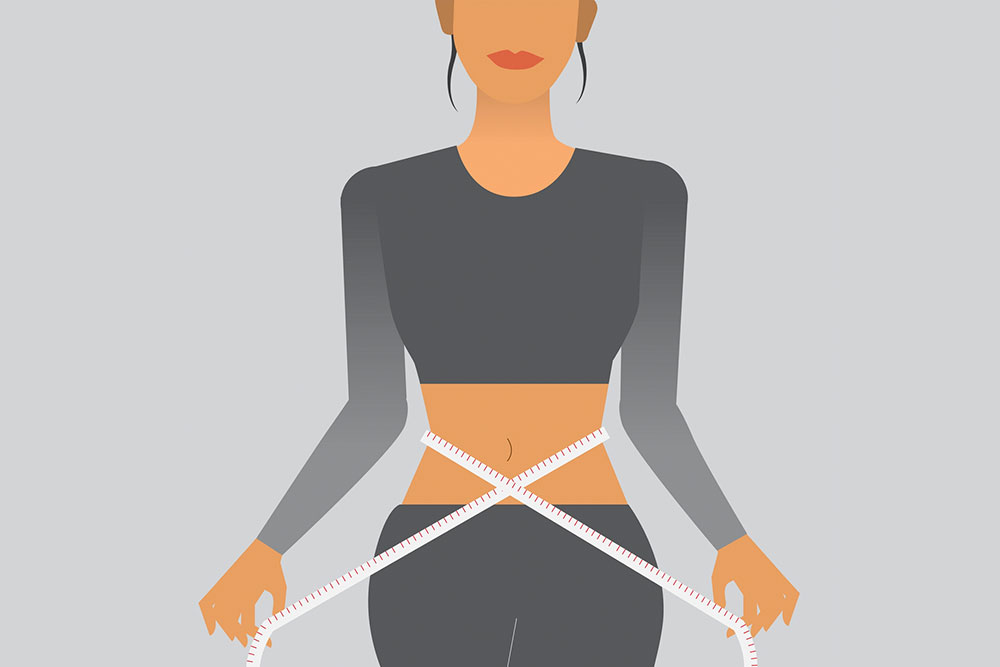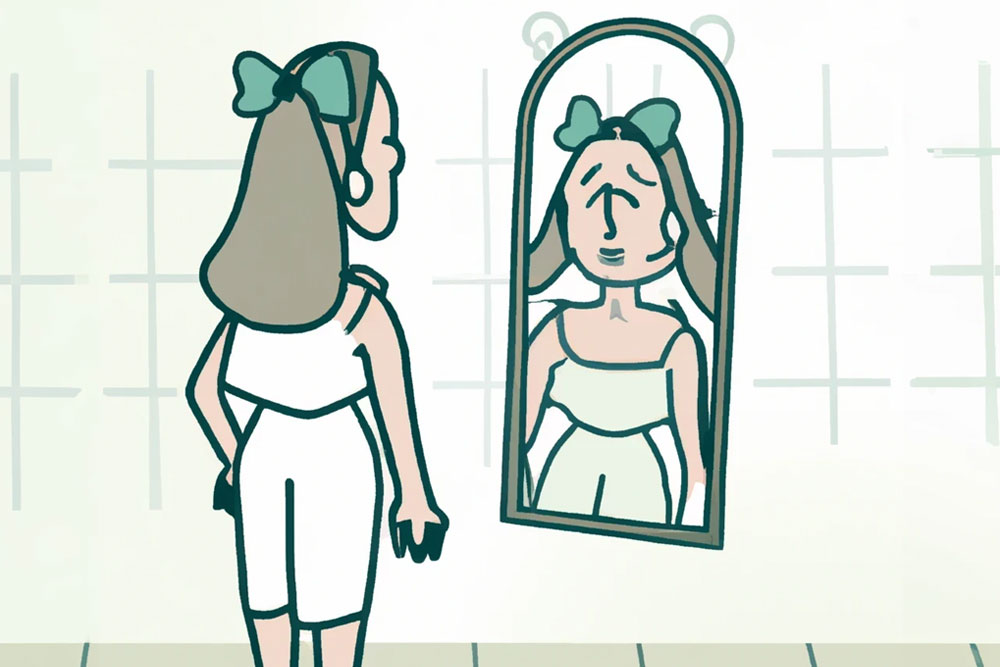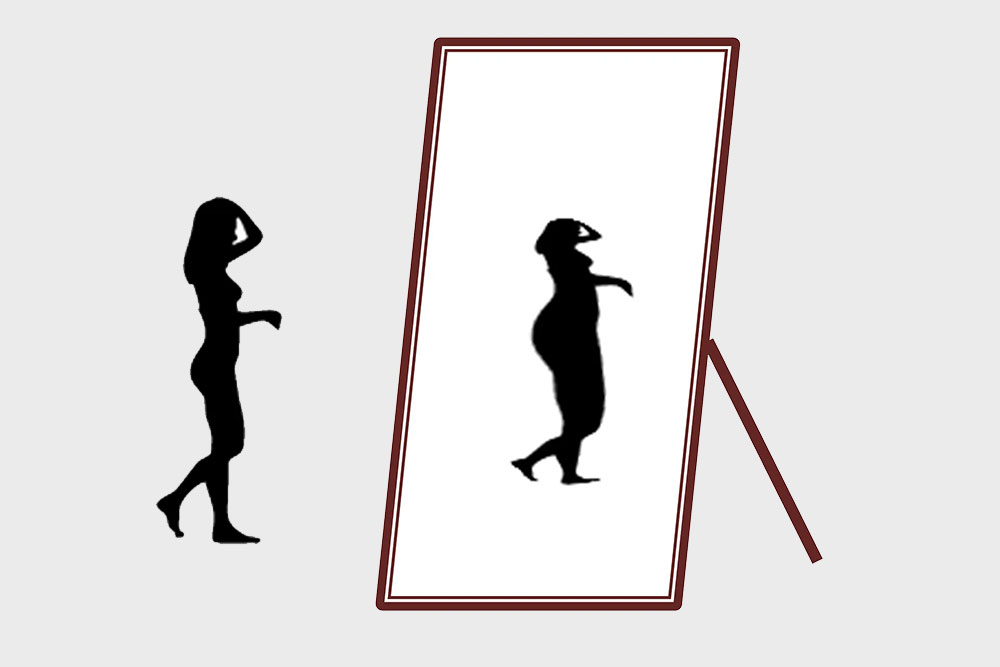Anorexia Nervosa
Published on September 20th, 2017
Updated on January 3rd, 2024

Anorexia nervosa is an eating disorder that affects many people, both men and women. It is triggered by self-esteem challenges and issues with body image. People who suffer from anorexia nervosa struggle with the daily stress of the disorder. It is a challenging disorder to recover from but can be overcome with a commitment to treatment.
The disorder manifests through severe malnourishment. In more clinical terms, it involves the refusal to maintain appropriate energy (calorie) intake to support a healthy body weight.
A healthy body weight is considered based on the individual’s age, sex, and height. Those diagnosed with anorexia are not only typically severely underweight, but also suffer from an extreme fear of gaining weight and a distorted body image.
Sponsored by

Choose a therapist to work with and start healing with 20% off from BetterHelp.
Click HereNote: A person does not need to be underweight to be suffering from anorexia nervosa.
A distorted body image may inhibit the ability to recognize the low body weight. It also causes the individual to perceive their own body very differently than it actually is. Most people with anorexia nervosa perceive themselves to be a fat and unsightly person. Even though they believe the image they are seeing, the objective truth is not reflective of what they see in the mirror.
Key Features Of A Person With Anorexia:
- Persistent efforts to restrict diet and calorie intake
- An intense fear of gaining weight or extreme efforts to prevent weight gain
- An unrealistic impression of their weight, shape, or what they look like in the mirror
Warning Signs Of Anorexia Nervosa
It is important to know the potential warning signs of anorexia nervosa. The condition is best treated when caught early. Knowing the warning signs of anorexia nervosa can be instrumental when concerns arrive about yourself or a loved one. The following are warning signs that a person may be suffering from anorexia:
Being Body-Focused
Individuals who develop anorexia are typically unhappy with their physical appearance and become fixated on all things concerning their body. The following are all behaviors and attitudes to watch out for:
- Commenting negatively about their body
- Repeatedly looking in the mirror (body checking)
- Asking others for reassurance about weight or shape
- Comparing bodies with others
- Frequently using the scale to weigh themselves
- Increased exercise
Food Obsessions and Rituals
If you suspect someone you know might have anorexia, look out for a combination of some or all of the following habits around food:
- Only eating at certain times
- Sticking to specific foods
- Eating foods cyclically
- Counting calories
- Taking small bites
- Eating very quickly
Note: Each of these behaviors does not individually indicate a case of anorexia. Anorexics develop many of these behaviors as obsessions around food as a way to feel in control. These behaviors are excessive, and not due to popular dieting, exercising, or body-building habits.
Emotional Changes
Someone in the early stages of an eating disorder will most likely exhibit a change in emotions. Increased irritability is common, which is often a result of malnourishment. Irritability can also become apparent as a result of increased sensitivity to criticism. People with anorexia are already highly self-critical, and any added criticism from the outside world becomes very difficult to absorb.
Food and Meal Time Warning Signs
Skipping meals is a significant indicator. A person suffering from anorexia may also try to minimize or hide their behaviors. They may say things like, “I’m not hungry” or “I already ate” in an attempt to avoid eating. If the individual is willing to sit down for a meal they may want to weigh the food or use a “chew and spit” method of eating. Some individuals struggling with anorexia will also make lists of “good” and “bad” foods, only eating the foods on the “good” list- which is often very limited.
What many do not realize is that those struggling with anorexia are often actually obsessed with food. This may cook extravagant meals for others but not actually consume them. Similar is the frequent focus on television about cooking and recipes.
Fear of Weight Gain
Solely controlling food intake is typically not enough to compensate for the anorexic’s fear of weight gain. There may also be the use of diet pills or laxatives.
Another way an affected person may control weight is through exercise. While a moderate amount of exercise is part of a healthy lifestyle, many with anorexia will exercise in an increasingly escalated manner.
Perfectionism
The rigidity that those struggling with anorexia have for their body and food is the same rigidity they often apply to other areas of life. Like seeking a perfect body, anorexics also seek perfectionism in other areas of life such as work and school. The drive for perfectionism in anorexia tends to stem from the intense self-criticism that these individuals endure.
Isolation
Isolating from friends, family, and activities is also a significant warning sign for anorexia. Some reasons for this include wanting to hide symptomatic eating disorder behaviors (avoiding meals, exercising, etc.) or feeling hopeless, anxious, and/or depressed.
The following are potential warning signs of anorexia nervosa:
- Significant weight loss
- Calorie counting
- Spending a lot of time thinking about food
- Being highly critical of one’s own body
- Refusal to eat
- Laxative use
- Isolating, or spending more time alone to hide personal struggles with their condition
- Substance use/abuse
- Wearing loose-fitting clothing (to hide their body)
- Excessive exercise
It is important to know the potential warning signs of anorexia nervosa. The condition is best treated when caught early. Knowing the warning signs of anorexia nervosa can be instrumental when concerns arrive about yourself or a loved one.

Causes And Risk Factors Of Anorexia Nervosa
Anorexia is a complex disorder that affects different types of people for different reasons. Many tend to be mistaken when thinking it develops from a desire to be skinny. It rarely develops as a result of one individual issue, like body image or weight management.
People who suffer from anorexia tend to have trouble coping with different challenges in their lives. This struggle to cope results in the symptoms of anorexia. Common causes tend to revolve around the environment, mental health, biology, and genetics.
Mental Health and Self-Esteem Challenges
Those with anorexia may also struggle with the following mental health issues:
- Low self-esteem
- Low self-worth
- Poor stress management skills
- Depression
- Anxiety
- Bipolar disorder
- Substance use
- Obsessive-compulsive behavior
- Perfectionism
Stress plays a major role in the onset of anorexia. Stress can come from social pressure, cultural expectations, and pressure to perform professionally or academically. Many people with anorexia tend to struggle to cope with stress. This struggle can cause a person to develop a need to maintain a sense of control. This results in patterns of excessive exercising and restricting diet.
Social and societal pressure to act and look a certain way contributes to the onset of poor body image. While body image is not the sole causal factor, it does play a role in the onset of anorexia. With the pressure put on people to look and act a certain way, people can tend to develop symptoms. These behaviors are closely related to self-esteem and self-image.
Family influence can increase the risk of having anorexia. Anorexia can run in families. Many people who suffer from anorexia have family members who also suffer from anorexia or other types of eating disorders. Family members can model behaviors of anorexia, like:
- Restricting diets
- Excessively exercising
- Purging and starvation
- Constant weight and body image checks
- Obsession with personal looks or preventing weight gain
It is not uncommon to see people who suffer from anorexia have family members who are overly critical of how they look. Family members may send messages or make comments about an affected person’s body or looks, causing deep insecurities and stress to look a certain way. Oftentimes these expectations are either unattainable or cannot be maintained in the long term.
Suffering from perfectionism is a major reason why many develop anorexia. Those who suffer from anorexia tend to have a difficult time not feeling in control. This may cause a person to seek a sense of control through restricting dieting and pushing their body past its limits. Anxious tendencies also manifest in a need for perfectionism. This will also cause symptomatic behavior that will result in anorexia.
Trauma can increase the risk of anorexia. It is not uncommon for a person to develop anorexia as a means to cope with a traumatic event. Those who have suffered from trauma or abuse, especially of a sexual nature, are at risk of developing anorexia.
Symptoms Of Anorexia Nervosa
People who suffer from anorexia will exhibit physical, behavioral, and emotional symptoms. These symptoms will be strong and withstanding.
Symptoms of anorexia are oppressive and will cause a great deal of distress for the affected person. They will struggle to cope with their condition, along with other emotional challenges.
Common symptoms Of anorexia include:
- Loss of appetite
- Crying spells
- Irritability
- Compulsive behaviors or rituals
- Vomiting immediately after a meal
- Rapid weight loss
- Tooth decay
- Hair loss
- Yellowing skin
- Loss of menstrual cycle
- Brittle nails
- Rapid weight loss
- Thoughts of suicide
- Beliving they are overweight
- Fatigue
- Easily bruising
- Headaches
- Stomachaches
- Dizzy spells
- Dehydration
- Fainting
- Depressed mood
- Anxiety
Common Behaviors of People with Anorexia Nervosa
There are common behaviors that a person with anorexia nervosa may exhibit. These are symptomatic behaviors of the condition. Behaviors that may indicate a struggle with anorexia nervosa include:
- Water loading. Drinking excessive amounts of water or other liquids to achieve a feeling of fullness and decrease hunger pains. Water loading is also used to achieve a “false” weight on the scale. This is used as a way to deceive doctors or dietitians into seeing a normal or improved body weight.
- Punching one’s own stomach. This is done as a way to fight hunger pains.
- Visiting “pro-ana” websites. “Pro-ana” or pro-anorexia websites are places for people who are active in their eating disorder to find tips to fight hunger, lose more weight, read personal stories, and view pictures to inspire the drive towards thinness.
- Frequent checking of the scale.
- Refusal to eat in public.
- Ritualistic food behaviors. This may include only eating certain foods, cutting foods into small pieces, eating in cyclical nature, and not mixing foods.
Patients with anorexia often exhibit symptomatic behaviors, like:
- Binging (Eating an excessive amount of food in a short amount of time) and purging (Inducing vomiting)
- Obsession with the calorie content of foods
- Compulsive habits of checking mirrors
- Avoiding social events or gatherings that involve eating or talking about food and eating
- Excessive exercise
- Covering up the body with layers and baggy clothes
- Irritability, especially when confronted with concerns or comments about eating habits or weight
- Only eating in private
- Mood swings, especially around mealtimes
- Focus on body shape and size
- Having/using diet pills and laxatives
Medical Consequences of Anorexia Nervosa
The most obvious physical sign of anorexia is weight loss, other medical consequences that occur. These medical consequences can be hazardous to the affected person’s health. They can create long-term medical consequences if not properly addressed early by medical and mental health professionals.
The primary consequence of anorexia is malnutrition. As a person with anorexia starve themselves or use compensatory measures to prevent weight gain, they prevent themselves from getting the nutrition they need to be healthy.
The malnutrition will cause depression, anxiety, and fatigue. It will also cause the body to begin eating its muscle and fat storage to make up for the nutrition it is not getting from food. Malnutrition affects bone density, muscle tone, and the body’s immune system. It will play a significant role in each of the following medical consequences:
- Amenorrhea. When a woman suffers from anorexia nervosa, they face the risk of amenorrhea. Amenorrhea is when a woman stops having a menstrual cycle and getting their period.
- Hair loss, dry skin, and brittle nails. Hair loss and brittle nails can occur as a consequence of a lack of vitamins, nutrients, and fluid intake.
- Constipation. Constipation can be due to muscle weakening from malnutrition and a lowered metabolism. Dehydration also contributes to the condition.
- Lanugo. A low body temperature can cause lanugo. Lanugo refers to fine, soft hairs that can grow on the body and limbs. These fine hairs grow to compensate for the low body temperature experienced by people who struggle with low body weight.
- Discolored hands and feet. Discolored hands and feet can occur due to poor circulation. Poor circulation can result from muscle weakening and organ failure.
- Osteopenia. Osteopenia refers to bone density loss, which occurs in reaction to malnutrition.
- Low blood pressure. Low blood pressure also is the result of poor circulation and the weakening of muscles. It can also result from low blood sugar. Low blood pressure can cause uncomfortable side effects, like headaches, dizziness, or lightheadedness.
- Anemia. Anemia is a condition that causes a low blood cell count, which prevents the body from getting enough oxygen. Oxygen is carried through the body by blood cells. If you have a low blood cell count you will not get enough oxygen to your brain and other organs.
- Infertility. Your body’s ability to produce and regulate hormones is affected when you are underweight and malnourished. If left unaddressed a person may become permanently infertile.
- Kidney damage. Anorexia causes deficits in electrolytes, potassium, and proteins. These deficits cause the kidneys to stop working properly. Kidney damage can cause kidney failure.

Treatment Of Anorexia Nervosa
Anorexia is an oppressive illness. You or someone you know may be struggling with this disorder. Anorexia may need to be treated medically, with nutritional guidance, and with therapy.
Exploring treatment for a loved one can be an especially daunting and scary time. There are numerous options and various types of treatment to fit the individual’s needs. Those who suffer from anorexia will engage in problematic behaviors to maintain a sense of control. They do not realize how severely their health is being affected.
If anorexia is left untreated, it can cause serious and sometimes fatal consequences. It is possible to die from anorexia, and the longer it takes to get proper treatment the higher the risk of death and permanent damage to the brain and body. When treating anorexia it is important to treat not only the symptoms but also the underlying causes of the condition.
Treatment of anorexia often involves several different forms of attention. Depending on individual circumstances, each person with the condition will be different. Some will be open to treatment, while others will deny a problem. It is very difficult for a person who suffers from anorexia to take the necessary steps to get better. Treatment requires patience, persistence, and a routine.
Treatment of anorexia often involves several different modalities, including:
- Individual Therapy. Counseling techniques are used to treat a case of anorexia. With individual therapy, the patient works to change patterns of thinking and behaving. This helps to promote healthy eating and coping with emotions.
- Group Therapy. Group therapy is often incorporated into a patient’s treatment. Group therapy allows patients to feel supported by each other as they go through similar struggles in treatment.
- Family Therapy. Family therapy is especially popular for children, teens, and young adults with anorexia. Families are not only often a contributing factor to the development of anorexia, but can also be a huge influence on the recovery process. Family therapy can provide insight into the history and origin of the individual’s eating disorder. Family therapy is a place where the family can learn about the condition and how to support their loved one.
- Nutrition Counseling. Treatment of anorexia typically involves a nutritionist. A nutritionist helps ensure that the patient is progressing to maintain normal body weight. They will also help by educating the patient about healthy eating and coping habits.
Levels of Care
Inpatient Treatment or Hospitalization. Inpatient treatment is recommended if the patient’s health is compromised. It is also recommended if they have little to no motivation for recovery. Inpatient treatment provides 24-hour care and monitoring. It may also be equipped with gastric feeding tubes for clients, should that be necessary.
Unfortunately, this often means a parent or loved one must impose treatment on the individual. This can become increasingly difficult if the anorexic is an adult and is unable to see the need for treatment. If this occurs, petitioning for involuntary hospitalization might be a lost option. Laws and procedures vary from state to state, so researching one’s state of residency could be the first step.
Residential Treatment. Residential treatment provides a structured environment and 24-hour care. It is much like inpatient treatment but in a more home-like atmosphere. An individual must be medically stable to be appropriate for a residential treatment center.
Example: If a patient is in immediate need of care or is refusing to cooperate with treatment, the safest option may be residential care. There, the patient can be monitored appropriately.
Day Programs. A day program is for those who need ongoing structure and support but no longer need 24-hour care. This means the patient is medically and mentally stable, but still is struggling with managing their condition. These individuals require continued participation in therapeutic modalities, like:
- Individual counseling
- Group counseling
- Nutrition counseling
- Support around meals
Outpatient Services. If the affected person can maintain a healthy weight and follow a meal plan, outpatient services are a viable option. These include individual therapy and nutritional counseling sessions. Numerous therapeutic approaches have shown success in the recovery from anorexia.
Medication. There is no medication to cure anorexia, but it can help with addressing underlying mental health issues. Anti-depressants can intervene in depressive symptoms that frequently come with anorexia. Other medications used to treat Obsessive-Compulsive Disorder (OCD) have been prescribed for anorexia. This is typically intended to minimize symptoms of perfectionism that can be seen in both conditions.
Note: It is up to the person struggling with anorexia to choose to get into treatment and recover. As a parent, you can put your child into treatment, but no one (child or adult) can be forced into recovery. There are ways to compassionately encourage a loved one to seek treatment. You can also learn methods of supporting them throughout the process.
Therapeutic Approaches
Different therapeutic approaches may be used in individual and group counseling sessions. Such approaches that can help a patient in recovery include:
Cognitive Behavioral Therapy (CBT). CBT is considered to be one of the more effective treatments for anorexia nervosa. It helps change the negative patterns of thinking that create harmful behaviors that fuel the condition.
The process of CBT involves identifying negative self-talk and challenging negative beliefs. This is followed up with the process of incorporating healthier, more realistic thoughts can take place.
Dialectical Behavioral Therapy (DBT). DBT skills are easily accessible in everyday life and are effective in decreasing depressive symptoms. DBT is especially useful in working with patients with eating disorders. This is due to the emphasis on personal acceptance.
Key Focuses of Dialectical Behavioral Therapy
- Mindfulness
- Emotional Regulation
- Distress Tolerance
- Interpersonal Effectiveness
- Radical Acceptance
Trauma Treatment. Many people who suffer from anorexia have experienced trauma at some point in their life. The eating disorder becomes a way to deal with the ongoing effects of that trauma. Thus, healing the trauma is essential to healing anorexia. There are numerous approaches to address this trauma.
Example: Eye Movement Desensitization and Reprocessing (EMDR). EMDR is based on the idea that a traumatic event overloads the body’s natural coping mechanisms. This causes them to shut down, due to the brain overloading and leaving disturbing images or events “frozen” or unprocessed. EMDR uses a standardized set of protocols to help the brain create connections and allow the reprocessing of the traumatic event.
Relapse Prevention
Every case of anorexia looks slightly different, as does the process of recovery. Every person has a different willingness to accept the disorder, readiness for change, and motivation to recover. Recovery from anorexia requires a lot of hard work and patience on the part of loved ones.
Stages of Change
- In the pre-contemplation stage, the individual is not ready to change. They do not see the problem or are unwilling to acknowledge it.
- In the contemplation stage, the individual is aware there is a problem, but not sure what they want to do about it. The decision to recover can change from day to day.
- In the preparation stage, the individual is in a place where they have decided to change but are unclear about how to do it. This can be a time of immense confusion and anxiety.
- In the action stage, the individual is committed to making the necessary changes to recover from anorexia. This includes taking the necessary steps to change actions, behaviors, and environments. This stage occurs once an affected person seeks treatment and support.
- In the maintenance stage, the individual is focused on maintaining their new, healthier behaviors. This stage is ongoing, yet relapse is also possible during this stage.
Risk of Relapse
Achieving full recovery is a great achievement, but the likelihood of a relapse is always present.
Relapse is a return to old eating disorder behaviors for a period of time. Relapse usually follows a phase of increased stress and inability or unwillingness to use healthy coping skills.
Although relapse is not isolated to a single incidence of the negative behavior, it does not equal failure. Instead, it is a time for the anorexic to seek professional help.
Although it is a common occurrence in anorexia, there are ways to help prevent relapse. It is important for family and support people to be aware of the anorexic’s red flags (or warning signs) to relapse. These may include many of the same signs the individual displayed at the onset of their disorder.
Slip vs. Relapse
Slips also frequently occur in recovered anorexics. Slips are often confused with relapse, yet there is a significant distinction. A slip is a one-time return back to old eating disorder behavior. Unlike with relapse, the behavior is isolated to a single incident and does not continue for any period of time.
As with relapse, exploring the intention behind the slip is meaningful. Commonly, it is an unhealthy reaction to a particularly stress-inducing event. When slips occur, the person struggling should get back on track immediately with the meal plan, exercise plan, etc., and tell someone about the slip by reaching out and asking for support.
Identifying what triggered the slip, exploring healthier coping skills for the future, and self-forgiveness are also vital steps to moving on from the slip.
What Can You Do To Prevent Anorexia Nervosa?
With the growing media frenzy around unattainable beauty ideals, the plastic surgery craze, and the increasing pressures children are under today, many parents wonder how they can help safeguard their children from developing anorexia.
While there are no guarantees, there are things you can do to support your child’s healthy body image and self-esteem.
- Encourage healthy eating habits. Have regular meals and snacks throughout the day. Eat when you are hungry and stop when you are full.
- Eat together whenever possible.
- Do not classify foods as “good” or “bad”.
- Provide education about the media. An example would be to show your kids how photo-shopping works.
- Be tuned in to your child’s comments about their body or appearance.
- Throw away the scale.
Anorexia is a serious disorder that can lead to devastating consequences if not addressed by a professional. If you are concerned that you or a loved one is suffering from anorexia, consult with a mental health professional or your primary physician.
Sponsored by

Find an affordable therapist online with 20% off from BetterHelp.
Click Here






Leave A Reply